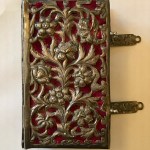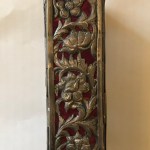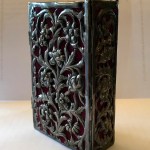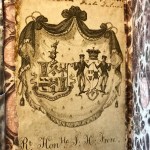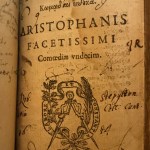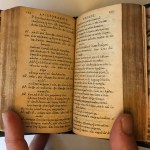ARISTOPHANES. Kōmōdiai endeka. [Comoediae undecim]
Leiden, Ex Officina Plantiniana, Apud Christophorum Raphelengium,…, 1600.
SOLD
12mo, pp. (iv) 620, A-G8 H4 I-Z8 a-q8 s2 (wanting A3 and final blank). Greek letter, sporadic Roman. Plantin device on title page and autograph of the English courtier Sir Robert Stapylton (1607-69)), dated 1654, plus another early autograph. Bookplate of the Right Honourable John Hookham Frere (1769-1846) on front pastedown. Slightly trimmed, annotated and underlined throughout with pencil, lightly browned and dampstained, leaves m2, n2 and o with marginal worm tracks and occasional minimal affection of text; q with part of upper margin torn apart with loss of a few letters. Faded pencil annotations on front and rear endpapers, marbled pastedowns. In a late elaborate mid C18th silver binding with floral motives, boards covered in scarlet velvet, clasps and catches. An interesting yet slightly defective copy in a remarkable binding and with a prestigious provenance.
An acclaimed and attractive pocket edition of the plays and dramas of Aristophanes printed at the Plantin Press. Aristophanes was the greatest of the Athenian comic dramatists and one of her greatest poets. For richness and fertility of imagination probably only Shakespeare is comparable and Aristophanes’ direct influence on English literature was considerable; the comedies of Jonson, Middleton and Fielding derive from him. Apart from constituting one of the surviving glories of Hellenic culture Aristophanes’ comedies are an invaluable source for its social history. His surviving plays, out of a probable forty or fifty, provide us with an accurate if satirical commentary on the political, religious, sexual, economical and domestic life of Athens over a period of thirty six years. His changes in style and content match the concurrent constitutional and social changes in the State itself. The plays’ themes are invariably contemporary, a mocking mirror to the condition of the city. This edition has the benefit of the scholia of Thomas Magister, John Tzetzes and Demetrius Triclinus themselves incorporating much of the more ancient commentaries of Appolonius, Callimaches, Didymus and others, which were superseded in later editions by much newer but also much inferior work.
Adams A1717


